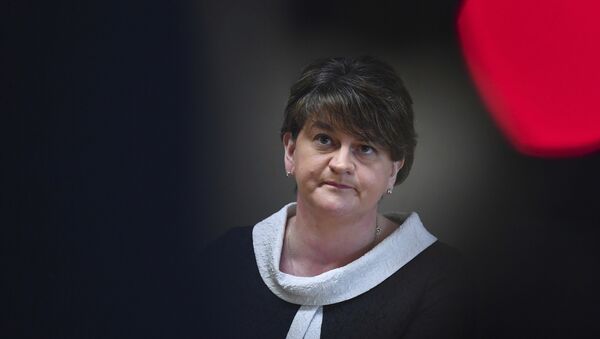Democratic Unionist (DUP) Leader Arlene Foster called a potential vote to reunify the island of Ireland would be "absolutely reckless" on Sunday.
Speaking to Sky News, the first minister hit out at Irish nationalist parties for focusing on "constitutional politics" during the coronavirus pandemic, saying she finds the discussion "disappointing".
"We all know how divisive a border poll would be, and for us in Northern Ireland what we have to do is come together to fight against Covid, and not be distracted by what would be absolutely reckless at this time", she said.
However, she added that if there were to be a vote on Irish unity, the arguments for keeping the United Kingdom together are "rational, logical, and they will win through".
This follows a survey organised by the Sunday Times and LucidTalk in Northern Ireland that 51% of the population support holding a referendum on Irish unity within the next five years.
🚨POLL🚨@LucidTalk (Northern Ireland)
— Next Irish General Election (@NextIrishGE) January 23, 2021
Support for a holding a border poll within 5 years:
Yes: 54%
No: 46%
(Excludes DK’s at 5%)
Sample - 2,392
January 15-18th, 2021
Sinn Féin leader Michelle O'Neill, who supports Irish reunification, said that an "unstoppable conversation" on the topic was already taking place.
The deputy first minister called on the Irish government "to step up preparations" for a poll on the border issue.
Over 50% of people here support a referendum on unity in the next five years
— Michelle O’Neill (@moneillsf) January 23, 2021
There is an unstoppable conversation underway on our constitutional future
It is time for the Irish Government to step up preparations
We can overcome the barriers of partition and build a new Ireland
Groundwork for a potential vote on Irish reunification is included in the Good Friday Agreement, which led to an end to decades of violence in Northern Ireland.
Under the agreement, the Northern Ireland Secretary in Westminster must call a border poll at any point where it appears "likely" that thre is majority support in the devolved territory for a united Ireland.
This comes just a month after the UK left the European Union's economic structures. The deal with Brussel's keeps Northern Ireland functionally in the Customs Union to avoid a hard border and any disproportionate regulatory framework between the two sides of the island.


